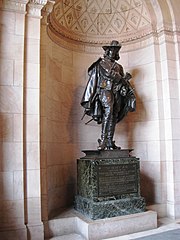Henry Vane

Sir Henry Vane (baptized May 26, 1613 in Debden , † June 14, 1662 in London ) was an English politician and statesman .
Henry Vane trained in Westminster and Oxford , then studied in Geneva and Leiden . In addition, he deepened his knowledge in Vienna by studying European relations. He traveled extensively on the mainland and then stayed for a few years in America, where he was governor of Massachusetts from 1636 to 1637 . Vane entered the Long Parliament in 1640 , belonged to the extreme opposition and played a large part in all of its important measures; in particular he worked against any settlement with the king. On June 23, 1640, Vane was knighted as a Knight Bachelor .
From 1649 to 1653 he was a member of the Council of State, but after the rump parliament was blown up he joined the opponents of Oliver Cromwell and was imprisoned by him for four months in 1656. In 1659 he was elected to Richard Cromwell's parliament and played a significant part in his removal. After the Restoration of Charles II , he was charged with participating in the murder of King Charles I and executed on June 14, 1662. The current dukes of Cleveland are descended from him.
literature
- Norman B. Springlane: Henry Vane. In: Biographisch-Bibliographisches Kirchenlexikon (BBKL). Volume 12, Bautz, Herzberg 1997, ISBN 3-88309-068-9 , Sp. 1118-1120.
Web links
- Biography on British Civil Wars (English)
Individual evidence
- ^ William Arthur Shaw: The Knights of England. Volume 2, Sherratt and Hughes, London 1906, p. 207.
| personal data | |
|---|---|
| SURNAME | Vane, Henry |
| BRIEF DESCRIPTION | English politician and statesman |
| DATE OF BIRTH | baptized May 26, 1613 |
| PLACE OF BIRTH | Debts |
| DATE OF DEATH | June 14, 1662 |
| Place of death | London |
